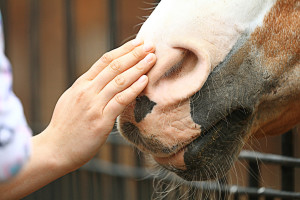Horses have had a close relationship with humans for thousands and thousands of years. They’ve grown and developed beside us, acting as our partners and companions. Horses are very emotionally sensitive. Sometimes they’re stubborn, sometimes they’re moody, and often they’re playful and like to have fun. They form strong family bonds and those connections are essential for their well-being.
All in all, they’re a lot like people.
Horses make such a great vehicle for therapy because they read humans so well. They act as mirrors for our state of mind, and react to our mental and emotional state in that very moment.
Equine Therapy Gets Us out of Our Patterns
One of the tricks of equine therapy is that it gets us out of our usual patterns in counseling and therapy. We get to step away from the problems that we’ve been stewing in and change our view, our setting, and our state of mind. Just changing the setting from an office to a pasture enables different thought patterns. This can help us tackle problems in another way, and overcome hurdles that we were stuck on previously. It can break down walls that are present in speech counseling.
Equine therapy can be challenging for some. Horses are big, powerful animals. Learning to overcome fears and connect with something that was previously intimidating can be an amazingly empowering experience, which can boost confidence and give us a victory that we can refer back to with future challenges. Patients who overcome relationship hurdles with a different species know that they can overcome those hurdles with other humans, too.
Equine Therapy Is About Building Relationships
Since horses read and reflect our own emotional state, we often see them starting to mirror relationships in our own lives. They can compare to our relationships with friends, parents, family members, and significant others. This helps patients understand an important truth: they can change relationships for the better by changing things in themselves - the attitude they project and the regard they have for others. They also learn that relationships take time and trust to build. And while it can be difficult, building an effective relationship is also very rewarding.
What Can You Expect from Equine Therapy?
First of all, know that with equine therapy, the safety of both the horses and the patients are first priority. Usually, all of the therapy happens on the ground. There’s no riding training or expertise needed. Most equine therapy tasks are focused around feeding and grooming, guiding and training the horses.
Equine Therapy Can Be Especially Effective in Addiction Recovery
Equine therapy can help people learn focus. They learn to reflect on personal challenges that led to their original problems, but in a safe, judgement-free zone. Equine therapy encourages focus and presence of mind. It gives us a safe space to work out personal problems and relationship dynamics, in a very hands-on, practical way.









